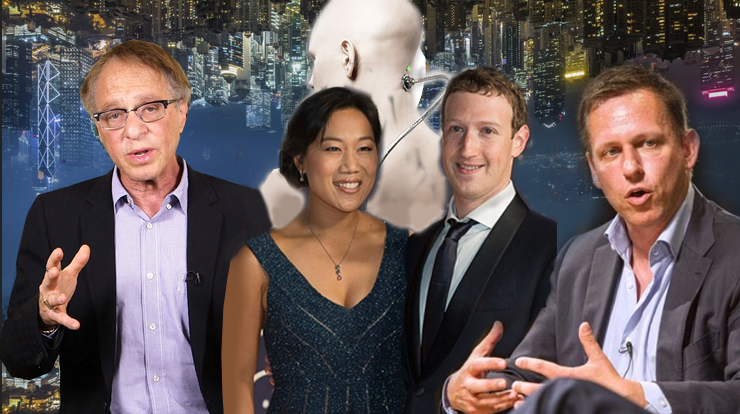
IMAGE: Valley of the Demigods: Ray Kurzwel, the Zuckerbergs, and Peter Thiel.
21st Century Wire says…
Silicon Valley sells its image as the place where ‘big ideas’ are supposedly born every day, and those ideas are supposed to change our world. But will they? While they may be dreaming big, are they really dreaming on behalf of the masses, or will their futuristic breakthroughs be reserved solely for their elite peers?
You could call it the ultimate expression of narcissism. You might know them as the transhumanists, or more formerly as the Extropians, always improving and fine-tuning their imperfect mortal shells, complete with bionic enhancements, cybernetic enhancements, augmented reality onboard, wired-in to a global A.I. hub that removes many of the mortal barriers facing 1.0 human beings today.
The pièce de résistance of their tribe would be the ability to upload one’s brain consciousness a la Kurzweil-style to the Amazon Cloud and experience ‘digital eternity.’ It’s a common obsession within the tech industry – the desire to achieve immortality, an ambition which is arguably more prevalent among this particular nuevo billionaire class than any other. The closest thing in history that’s comparable might be the explosion of elite techno-adventurists that sprung from the Industrial Revolution and its burgeoning financier class. Today’s tribe are not much different, in that they never had to perform any physical labour in building their unprecedented digital empires (unless you count typing or racquet ball as hard labour), and in doing so, becoming exponentially more rich in a shorter period of time than any other captains of industry before them. In other words: life’s been good, real good. So good, that they might even wager a billion from their nest egg to see if they can make it last forever.
 In 2016, Facebook boss Mark Zuckerberg and his wife Priscilla Chan (image, left) announced they were launching a $3 billion initiative to end all human disease. This was no doubt inspired by PayPal founder Peter Thiel’s pledge in 2014 pledge to ‘end mortality.’ Yes, anything is possible for the gods of the Silicon Valley. But not everyone is fawning over the tech Svengalis quest to cheat death though. Andrew Russell, a historian from SUNY Polytechnic Institute and vocal opponent of the ‘cult of innovation,’ brings the conversation back into sober focus:
In 2016, Facebook boss Mark Zuckerberg and his wife Priscilla Chan (image, left) announced they were launching a $3 billion initiative to end all human disease. This was no doubt inspired by PayPal founder Peter Thiel’s pledge in 2014 pledge to ‘end mortality.’ Yes, anything is possible for the gods of the Silicon Valley. But not everyone is fawning over the tech Svengalis quest to cheat death though. Andrew Russell, a historian from SUNY Polytechnic Institute and vocal opponent of the ‘cult of innovation,’ brings the conversation back into sober focus:
“It’s distressing sometimes to see the amount of effort—not just human effort but also the rhetoric—to develop stuff that turns out to be apps or toys for rich people.” He adds, “Saying ‘We’re innovating and that is by default making a world a better place,’ and then patting yourself on the back and getting in your Tesla and driving to your seaside ranch is missing the point.”
However, there may be a fatal flaw in their thinking, and one which would likely leave the rest of the 99.9% of humanity in perpetual misery. Herein lies the rub, exposing the naked underbelly of Silicon Valley futurism chic. Technology writer Emily Dreyfuss from WIRED explains the dilemma of the new thin-air billionaire in TEDx uptopia:
After disrupting the way we love, communicate, travel, work, and even eat, technologists believe they can solve the ultimate problem. Perennially youthful Facebook CEO Mark Zuckerberg and his wife Priscilla Chan announced last year a $3 billion initiative to obliterate human disease. Among his many crusades, Paypal co-founder and Trump advisor Peter Thiel aims to end mortality. (“Basically, I’m against it,” he has said.) Alphabet has a whole company devoted to curing this most intractable of inconveniences.
And they aren’t necessarily crazy to try. Since the 19th century, average life expectancies have risen for everyone (though not at equal rates) thanks to advances in science and technology. But over the past two decades, deaths attributed to inequality, isolation, and addiction have risen for both men and women without a college education in the US. In particular, as Princeton economists revealed today, white middle-aged men with a high school education or less, hit disproportionately by the Great Recession, are dying of despair. Well-heeled techies obsessed with life extension have little to say about these problems, suggesting a grim blind spot: Are they really trying to extend everyone’s lives? Or just those of people already doing great?
Solving these problems is hard, and made harder by the fact that the real fixes for longevity don’t have the glamour of digitally enabled immortality. “It turns out that technologies which extend, augment or otherwise improve human life are already here!” writes sci-fi author and futurist Paul Graham Raven in a take-down of what he calls “Retweet Transhumanism.”
“You may have heard of some of them: clean water; urban sanitation; smokeless cooking facilities; free access to healthcare; a guaranteed minimum income; a good, free education.”
Looking at today’s developed economies, and even in some of the most socialised ones – if there are life-saving procedures and technologies available, chances are they are only available to the super class who can afford them. Even if advanced medical technology exists, be it stem cell transplants, gene therapy or immunotherapy – it simply cannot be made widely available to the working classes. There are a number of reasons for this, which may be structural, societal and economical. And this is not only true for high-end treatments, but for low-end treatments and medical supplies too. If you want the best, you have to be able to afford the best. This mantra is virtually inescapable in today’s society, as it has been throughout human history. It’s not only true for medical and health, but more many millions of wage earners it’s also a struggle to pay for basic utilities like electric, heating, water, sanitation – the basics which make life bearable in most living situations.
Case and point: the single biggest barrier to good health and quality of life on the planet today can be reduced to one single factor: access to plentiful clean water. Yet, when you watch the endless stream of ‘big ideas’ and TED talks, and the virtue signalling at globalist confabs like Davos, the simple issue of water will never be sexy enough. While Zuckerberg and Thiel want to live forever, 1 out of 8 Africans would be happy just to experience a slice of normal life today.
Feudal, and Futile















